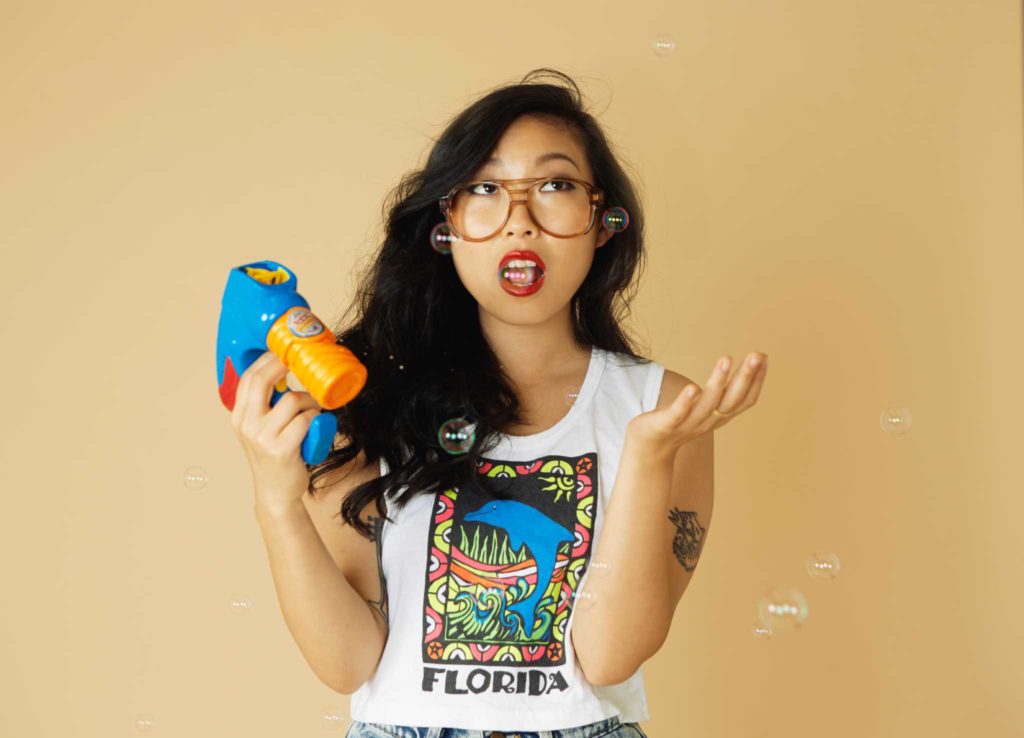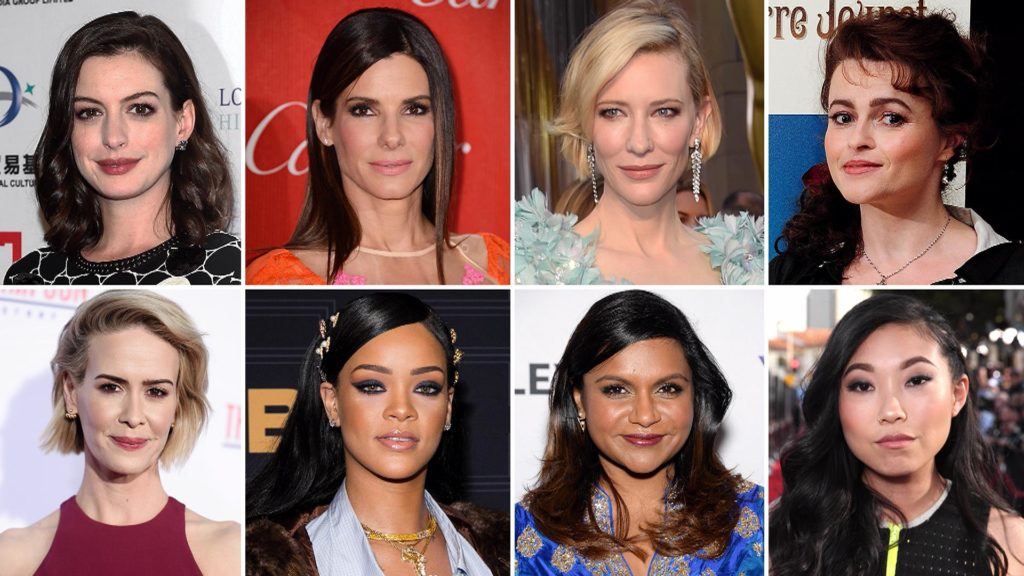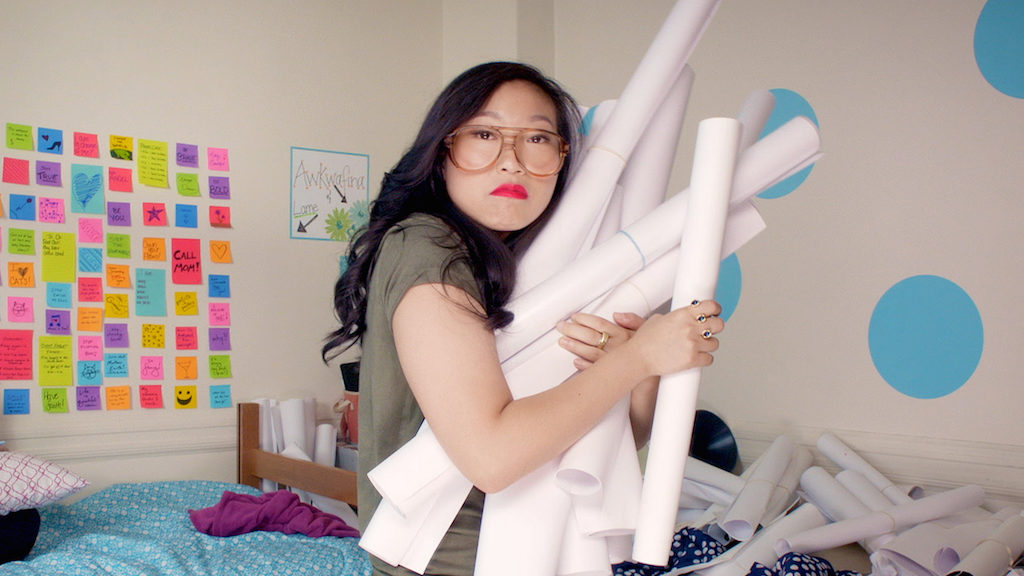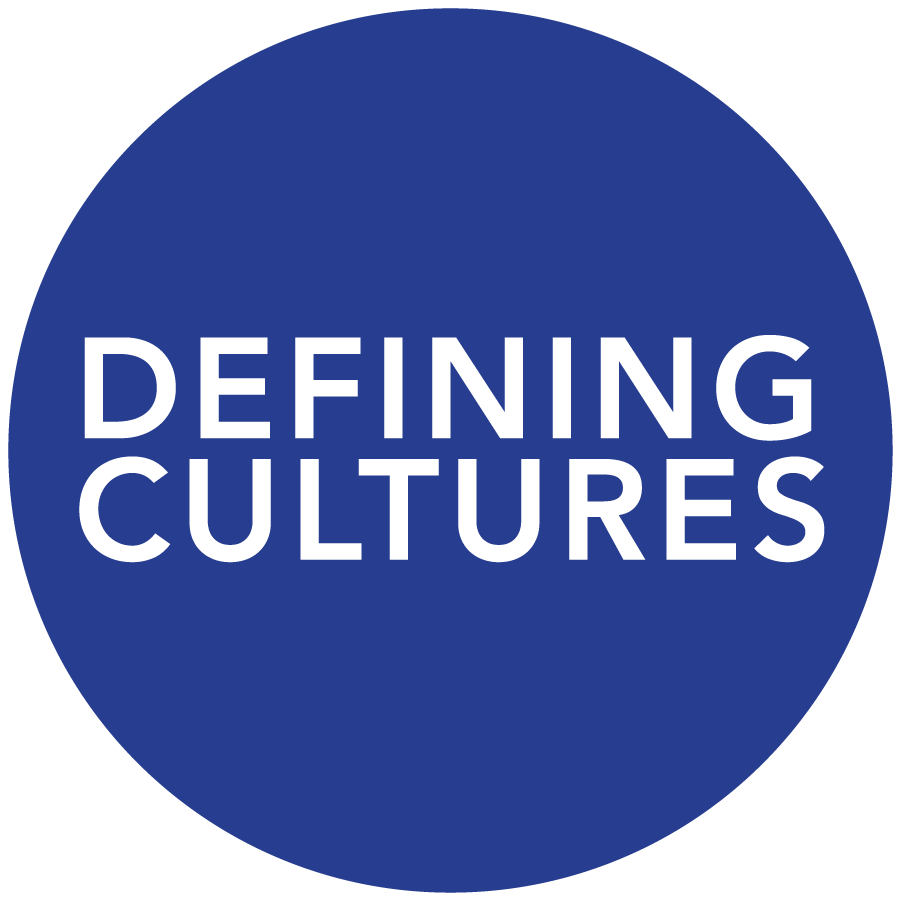 Credit: Shirley Yu
Credit: Shirley Yu
The journey to reclaiming cultural identity is not immune to celebrities. It’s a part of everyday life that takes no prisoners.
Queue in Chinese-Korean-American Nora Lum – also known by her stage name, Awkwafina. A born and bred New Yorker, tell-it-like-it-is chick with a witty persona that is breaking down barriers in the rap game and Hollywood.
Awkwafina rose to digital stardom in 2012, after debuting her self-produced rap track titled “My Vag.” And in 2016, won a Webby Award for “Tawk” – a no holds barred, late-night talk show she hosts on Verizon’s Go90 free streaming service.
Read Awkwafina's bio on Defining Cultures
But aside from being a comedian-rapper-actress, I wanted to learn more about her struggles as a first-generation American. Leaving the entertainment questions behind – minus getting the scoop on working with comedian Margaret Cho on "Green Tea" and A-list icons, including Sandra Bullock, Anne Hathaway, Cate Blanchett, Mindy Kaling and Rihanna, in the comedy heist film "Ocean's 8" – her journey is raw and real.

The all-female cast of "Ocean's 8." Top row (L to R): Anne Hathaway, Sandra Bullock, Cate Blanchett, Helena Bonham Carter. Bottom row (L to R): Sarah Paulson, Rihanna, Mindy Kaling, Awkwafina
• “As an Asian-American going to my motherland, and not speaking Chinese, I really felt the struggle of not being Asian enough. And in America, not being American enough.” •
I want to start by asking about your upbringing. What was it like and how did you deal with your father’s wishes to shoot for a stable job?
I grew up as an only child, and my mother died when I was four. My dad had to work, so I was really raised by my grandmother, who is a very unique type of Asian woman. She’s conservative, yet childish with a dark sense of humor, and gave me the freedom to do what I wanted to do. My family moved a lot and I changed schools at seven years old. I never really knew what I wanted to do. I never had a passion, and didn’t discover music until I was 11.
In my life, I never considered my father’s wishes as something I wanted to pursue. But I started to feel the pressure towards the end of high school going into college. I wanted to find an office job after college, and my dad was content with that.
So to what extent did your family support your ambitions?
My grandma was onboard since I was like 12 years old and wanted to take vocal lessons. Someone called that “spoiling,” but she knew I wasn’t a normal kid. She knew I was very unique and wanted to do certain things. She supported me since day one. When I got laid off of my job after making “My Vag,” my grandmother was there. She said do what you gotta do. I worked at a vegan bodega, Japanese sushi restaurant. I did random things, but my grandmother was always supportive.
My dad took a longer time. He wanted me to be stable. One day, at the height of when "My Vag" was going viral, I was on the cover of New York Magazine, and he stumbled across the article and realized it was me. To convince an Asian parent that you’re ok, is just to show them that you’re making money.
After high school, you moved to Beijing to study Mandarin at the Beijing Language and Culture University. How was that experience?
I grew up not speaking any Mandarin, but my grandmother speaks with an accent. She never taught me, but I grew up with her yelling Mandarin, so I was able to pick up the accent really well in Beijing. I couldn’t write a damn thing tho!
It was pretty difficult because Chinese people assumed that I was fluent in Mandarin. There were White kids that knew the language. I would walk around with my best friend who was Greek and spoke Mandarin fluently. So in public, she would become my translator, and Chinese people would wonder why I couldn’t speak for myself. They thought I was being disrespectful. But when they discovered I couldn’t speak the language, they were shocked and their reaction was like…aren’t you Chinese you ass hole?
I really felt like I was negotiating two identities in China. As an Asian-American going to my motherland, and not speaking Chinese, I really felt the struggle of not being Asian enough. And in America, not being American enough. So I really got the shock of having two identities in China. That was really hard for me.
You returned and attended the State University of New York at Albany (SUNY). Why did you decide to major in journalism?
I always liked writing, so journalism was more studious to me than creative writing. I also majored in women’s studies and it was weird how journalism and women’s studies complimented each other. I really wanted to follow the journalism route, so I interned at Times Union, a punk newspaper near the university and a punk website at New York City College. But I realized at the end of the day, it’s like an Ivy League club, no one really knows what you can do, so they judge you based on where you graduated. I didn’t go to journalism school at Columbia University or anything, so I gave up really quickly and didn’t do journalism anymore.
Instead, I discovered music in college and debuted "My Vag" a year after graduating [in 2012]. And instantly went viral.

Credit: Girl Code/MTV
China, SUNY, "My Vag," in that order. But at what point were you able to comfortably say, "This is who I am: a Chinese-Korean-American."
It took a really long time. I grew up being bullied. I think every Asian kid in America has been bullied in one point in life. I know a lot of Korean kids now that grew up in Korean communities and went to school with a lot of Asian kids. I didn’t do that. At one point I was the only Asian kid in my school, and hung out with White, Black and Spanish people so much that I began to wish I were them. And for a very long time, I really wish I wasn’t born Asian, because I felt like it made my life harder. I felt it as a burden.
It wasn’t really until I was 18/19, when I went to China, is when I felt a deep recognition and acceptance of "that’s what it is." And when I grew older, through my career as Awkwafina, I was more accepted into an Asian community. Now more than ever, I feel like I have an extremely strong Asian-American community that is nurturing. My four best-friends are these Asian rap dudes. I feel definitely proud now.
• “I have to negotiate my identity everyday. Some people recognize me, and other times, I go out on the street, and I'm [stereotyped as] an annoying Asian person.” •
Do you think you are a role model to other Asian-Americans?
Many people would like to admit that they aren’t. And in the beginning of my career, I really didn’t want to assume the position of a role model because then I’d have to be accountable for the things that I do. But now what I’m seeing, a lot of Asian women, girls, coming up to me saying that just seeing me perform my song "Queef" is exciting for them.
What Awkwafina does for young Asian-American girls, it shows them that it’s ok to be embarrassing, loud, rocket! When you grow up seeing more docile Asians around you, you’re going to assume that it doesn’t exist. If anything, I’m just helping people come out of their shell that they are already born in to. Entertainment is not an option for a lot of Asians. You don’t see many of us, so you don’t think it’s a possible option. I think every Asian entertainer is a role model at some point; even if they’re terrible. There’s power in numbers.
Drawing from your Asian and American culture, how do you balance your identity with your professional career?
What I’ve learned since entering the entertainment industry, I don’t have an extremist Asian mentality…that we should be running America. I believe we are in America, and should be respectful and mindful of that. So I’m still going to stick out and be an Asian person.
In the Obama era, I think my career flourished because it was an era of acceptance. Now we gotta be careful because of the climate we're in. If I speak out against President Trump, I may get it much harder than if I were White. I’m starting to feel tension now, as far as how outspoken I can be as a celebrity...because a lot of middle America doesn’t know who Awkwafina as a brand is. So they’ll see me as a chick that doesn’t know what she’s saying…that I’m just talking shit. I have to negotiate my identity everyday. Some people recognize me, and other times, I go out on the street, and I’m just like an annoying Asian person.
How was it co-writing and performing “Green Tea” with Margaret Cho? Who reached out first?
Dream come true. One of the highest points in my life!
Growing up, she was my only idol. I feel weird telling her that, but she was the only loud Asian woman that I had. I met other celebrities before her, but none that really struck me that deep. To actually talk to her, about the struggles of being an Asian woman in the industry, she gives me good advice. She’s very smart, highly intellectual, and doesn’t have that crazy, stand-up persona in-person.
Margaret reached out to me for "Green Tea." She found out about a documentary that I’m going to be in called “Bad Rap” with my best friends. Margaret Cho does music, so she wanted to do a rap song. She was in NY filming on “Late Night with Seth Meyers.” So one night, I brought her to my friend’s studio and we sung through the night. About a week later, I flew out to LA and we did the video at her house. It happened pretty quickly.
"Ocean’s 8" is slated to hit theaters summer 2018. Tell me about it.
A surreal moment! We started filming October 2016 in NY. Sometimes I feel like Forrest Gump. First I’m working with Margaret Cho, now I’m in "Ocean’s 8." What’s cool about it was I had waking nightmares: 'what if I talk to Cate Blanchett and say something weird?' But you work with them and they become co-workers. It’s a dream come true. The director, Gary Ross, is amazing, a genius. And just to work with those ladies and to be in the room with them is insane!
I want to end with one last question. What advice would you give to your 16-year old self?
If I could go back in time, I’d go back and whisper gently in her ear: 'don’t worry, you’ll be fine.'
• • •
- Awkwafina is currently featured in Bad Rap: an amazing documentary about four Asian-American rappers coming up in the game.
- This interview has been edited for brevity and clarity.
